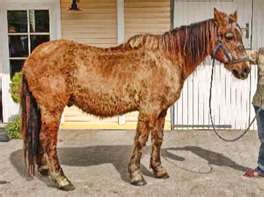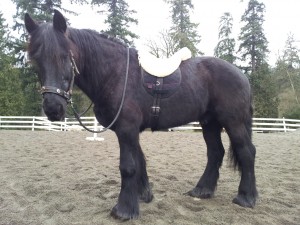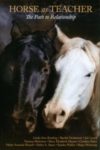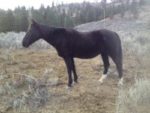Archive for the ‘Older Horses’ Category
Age Defying Equines- Part 3
by: Marcia King
Click this link for the original article in its entirety: TheHorse.com
Whether you consider a horse to be old at 18 or 25, at some point, senior horses are going to start showing clinical signs of aging–moving more slowly or stiffly, becoming unthrifty, developing a dull coat, or displaying subtle or obvious signs of a disease process. Here are some of the common problems you could encounter in your aged friend and what you should know about those topics to help him through those golden years.
In today’s Part 3 we will cover the following topics:
– Eye Problems
– Hoof Changes
– Reproductive Function
– Respiratory Factors
– Weight Loss
– Take-Home Message
—————————————————————
Eye Problems
“Any older animal will eventually develop age-related ocular disease,” says Ursula M. Dietrich, DrMedVet, Dipl. ACVO, ECVO, assistant professor in the department of small animal medicine and surgery at the College of Veterinary Medicine, University of Georgia. “This is due to the biologic clock ticking and decline of the cells’ regeneration capacity, but it is not known if the aging process may also be influenced by environment, nutrition, care, etc. Treatment of some ocular diseases in horses can be Read the rest of this entry »
Age-Defying Equines- Part 2
by: Marcia King
Click this link for the original article in its entirety: TheHorse.com
Whether you consider a horse to be old at 18 or 25, at some point, senior horses are going to start showing clinical signs of aging–moving more slowly or stiffly, becoming unthrifty, developing a dull coat, or displaying subtle or obvious signs of a disease process. Here are some of the common problems you could encounter in your aged friend and what you should know about those topics to help him through those golden years.
In today’s Part 2 we will cover the following topics:
– Cushing’s Disease
– Degenerative Joint Disease
– Dental Disease
– Chronic Diarrhea
———————————————————-
Cushing’s Disease
 Equine Cushing’s disease (ECD, or pituitary pars intermedia dysfunction) is commonly diagnosed in aged horses, says Rachel Jahnke, BSc, DVM, of Wisconsin Equine Clinic & Hospital in Oconomowoc, Wis. Due to a tumor that forms in the pars intermedia of the pituitary gland, Cushing’s results in excess production of cortisol hormone, which in turn leads to hirsutism (a long, often curly hair coat that does not shed out well), laminitis, lethargy, Read the rest of this entry »
Equine Cushing’s disease (ECD, or pituitary pars intermedia dysfunction) is commonly diagnosed in aged horses, says Rachel Jahnke, BSc, DVM, of Wisconsin Equine Clinic & Hospital in Oconomowoc, Wis. Due to a tumor that forms in the pars intermedia of the pituitary gland, Cushing’s results in excess production of cortisol hormone, which in turn leads to hirsutism (a long, often curly hair coat that does not shed out well), laminitis, lethargy, Read the rest of this entry »
Age-Defying Equines – Part 1
by: Marcia King
Click this link for the original article in its entirety: TheHorse.com
 Whether you consider a horse to be old at 18 or 25, at some point, senior horses are going to start showing clinical signs of aging–moving more slowly or stiffly, becoming unthrifty, developing a dull coat, or displaying subtle or obvious signs of a disease process. Here are some of the common problems you could encounter in your aged friend and what you should know about those topics to help him through those golden years.
Whether you consider a horse to be old at 18 or 25, at some point, senior horses are going to start showing clinical signs of aging–moving more slowly or stiffly, becoming unthrifty, developing a dull coat, or displaying subtle or obvious signs of a disease process. Here are some of the common problems you could encounter in your aged friend and what you should know about those topics to help him through those golden years.
In today’s Part 1 we will cover the following topics:
-Cardiac Dysfunction
-Colic
-Compromised Immune Function
——————————————————————–
Cardiac Dysfunction
“Older horses, in general, do not commonly develop life-threatening or career-limiting cardiac problems,” reports Laurie A. Beard, DVM, MS, Dipl. ACVIM, associate clinical professor at Kansas State University’s College of Veterinary Medicine. “Nevertheless, a decrease in aerobic and exercise capacity occurs in older horses. Older horses are not as able to Read the rest of this entry »


